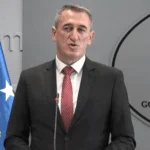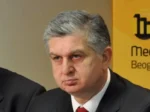Lubisha Vučković, from North Mitrovica, inhabited by a majority of Serbs, has closed his business with daily consumer goods for several months, as he was unable to provide Serbian products to consumers.
“The store does not work and I think it will never work again. The reason is simple: there are no our products at all”, says Vuçković, referring to those originating from Serbia.
He says that he has tried to continue the business with the goods that are available in Kosovo, but says that their sale has been weak.
“I tried to work with that commodity, from Turkey, [North] Macedonia… but it was not even close to the quality of our products. The customers have stopped coming and have given me this justification”, he says to Radio Free Europe.
The Kosovo government banned the import of goods from Serbia on June 15 last year, a day after Serbian forces arrested three Kosovo policemen.
While the policemen have been released from custody to defend themselves in freedom, the ban on most products from Serbia has continued. The ban was lifted only on the import of raw materials and semi-products, but not on finished products.
The European Union and representatives of the business community in Kosovo have asked the Government of Kosovo several times to abolish this ban, but it has not changed its position.
Some citizens of North Mitrovica, with whom Radio Free Europe spoke, say that this measure hits hard for those who cannot adapt to the products that have replaced the Serbian ones.
“As for us, the citizens, I think this measure has a lot of impact, because we are used to certain products that we have consumed throughout our childhood and growing up. Now we don’t have access to them”, says Teodora Zhivanovic.
She adds that medicines originating from Serbia are often missing from the city’s pharmacies.
For the replacement of Serbian products, REL has reported earlier that Kosovo businesses have increased imports from other countries, especially North Macedonia.
But Nenadi, also from North Mitrovica, says that he has the biggest difficulties with food products.
“Unfortunately, the products we buy here, to a large extent, are from Turkey or Western Europe. So, often when we buy something, we don’t know what we’re buying because we don’t understand what language [the instructions] are in and what their ingredients are,” he says.
Neither Teodora nor Nenadi expect the ban on Serbian products to be lifted soon.
Their municipality, like the others inhabited by Serbian majority in the north, are more connected to Serbia and do not easily obey the decisions of the Kosovo institutions.
When it made the decision to ban imports from Serbia, the Government of Kosovo described it as a security measure, and not an economic or commercial one.
Asked by Radio Free Europe if it is considering its repeal, the Government says that the decision depends on the evaluations of the security institutions in the country.
“The measures on the border with Serbia are security measures, due to the security risk coming from Serbia. It is the security institutions that make the continuous evaluations on the need or not of these measures”, says the written answer.
It also mentions the September 24 attack in Banjska – the northern part of Kosovo – where armed groups of Serbs attacked the country’s police, killing an officer. After this attack, the Kosovo authorities have also found large amounts of weapons.
This has caused “the security institutions to tighten the security measures on the border with Serbia”, says the response of the Government of Kosovo.
The Government of Kosovo recalls that, last month, Prime Minister Albin Kurti was in the Port of Hamburg in Germany, “to see closely the X-ray Cargo Scanning System and to learn more about the opportunities that Kosovo has to was equipped with such a system”.
In the Government’s statement given to REL, it is stated that this system “would help a lot in monitoring products that cross the border, guaranteeing a higher level of security without hindering trade”.
However, it is not clarified when this system will be available and whether the ban on Serbian products will remain in force until then.
For the head of the European Union Office in Kosovo, Tomas Szunyog, the measure that blocks the import of finished Serbian products in Kosovo contradicts the free movement of goods, which is one of the conditions required by the Growth Plan for the countries of the Western Balkans. .
Commenting on the issues related to this plan at the end of May, Szunyog said that it includes the condition for the free movement of goods.
“So we encourage Kosovo to lift the ban on Serbian products as soon as possible,” said Szunyog.







